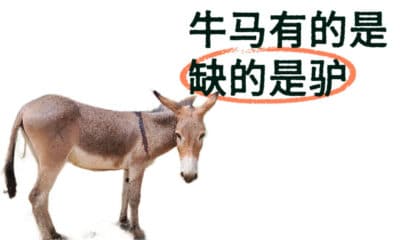China Society
Explaining the Bu Xiaohua Case: How One Woman’s Disappearance Captured Nationwide Attention in China
This is why Bu Xiaohua’s 13-year disappearance became such a major topic of discussion on Chinese social media.
Published
10 months agoon
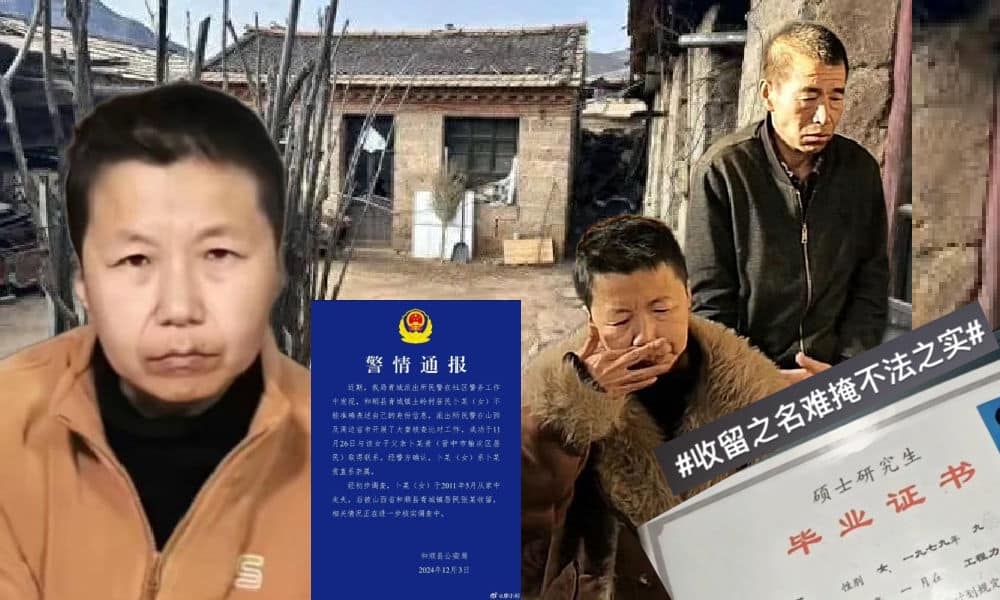
PREMIUM CONTENT
The story of Bu Xiaohua, a Chinese MA graduate who was reunited with her family after disappearing for 13 years, has recently dominated discussions on Weibo. Her case reveals much more than just the mystery of her disappearance—it highlights systemic failures and the vulnerability of women in rural China. Here, we unpack the key aspects of her story.
Her name is Bu Xiaohua (卜小花), but for the past 13.5 years, she lived a life without that name and without any connection to the person she once was.
The story of this Chinese female MA graduate from Shanxi’s Jinzhong, born on September 1, 1979, who disappeared for over a decade and was recently found living in a village just a 2.5-hour drive from her hometown, has sparked widespread discussion on Weibo and beyond. We previously explained the story in our article here.
In brief: On November 25, 2024, a woman from Heshun County (和顺县) sought help from volunteer Zhu Yutang (朱玉堂), who focuses on reuniting families with missing loved ones, to trace the origins of her “aunt,” who had been living with her uncle Zhang Ruijun (张瑞军) for over a decade. During this time, they had multiple children together, despite the woman clearly suffering from mental illness.
As volunteer groups and authorities got involved, it was eventually revealed that the woman was Bu Xiaohua (卜小花), an MA graduate from Jinzhong who had disappeared after experiencing a schizophrenic episode in the spring of 2011. Bu was found looking emaciated, bewildered, and unkempt, and was soon reunited with her family, who immediately ensured she received the help she needed. During a medical check-up, she was found to be not only suffering from mental illness but also from malnourishment.
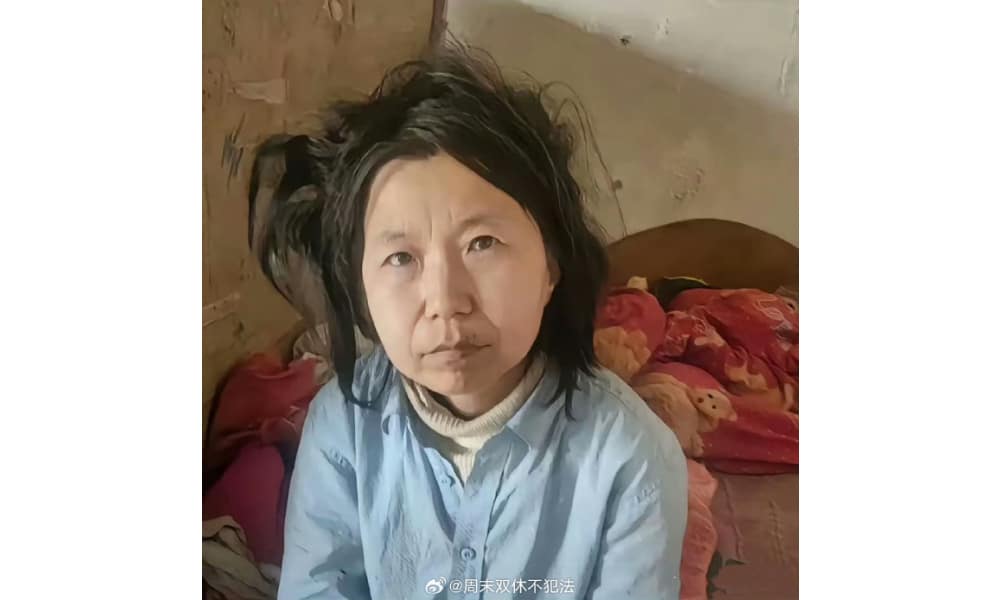
Bu Xiaohua in the Zhang family home.
When volunteers first met with Bu, they tried to get her to speak and learn more about her background. Among other things, she also wrote down several clues that led to the discovery of her identity, such as the names of family members. The first thing she wrote down was “run” (跑).
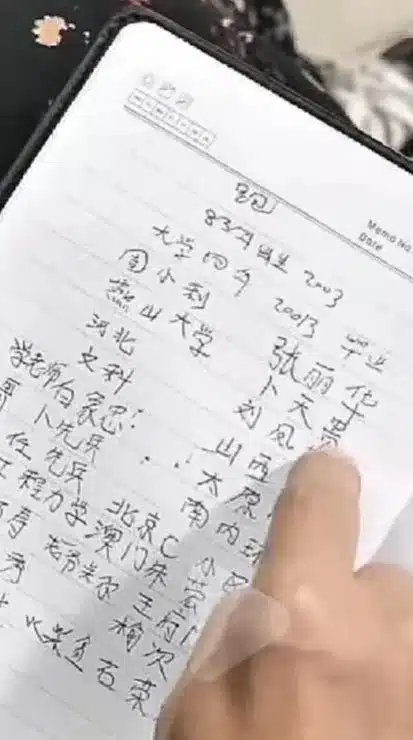
The note by Bu Xiaohua provided many clues about her life prior to being “taken in.”
As discussions about Bu’s disappearance continue, several aspects of this case have become focal points, highlighting the vulnerable position of Bu and many other women like her.
1. “收留”: Was She “Taken In” or Abducted?
One term that frequently comes up in discussions around Bu Xiaohua’s case is “收留” (shōu liú), meaning “to take in” or “give shelter.”
This term was used in various reports about Bu’s story, including in the first police report of December 3.

Police report of December 3, 2024, using the word “taking in.”
Many netizens pointed out that the initial police statement seemed to frame the situation as an act of human compassion, reflecting the niece’s account of how Ms. Bu allegedly “wandered” into their family home one day. The family claims they reported her to the police but eventually decided to “take her in.”
Netizens are outraged by the use of this term, as it glosses over the criminal responsibility of Zhang and his family, who essentially kept Bu Xiaohua away from her own family for over 13 years. They are accused of exploiting her mental illness and inability to consent to marriage or sexual relations, which resulted in multiple children. The exact number is unclear, though rumors suggest she had six children in total, with only two remaining in her care.
The oldest of the two children is already twelve, meaning she must have become pregnant not too long after going missing.
Some commenters have referred to this as “rape-style sheltering” (“强奸型收留”). Was it rape, human trafficking, or illegal detention?
While netizens speculated about the actual crime behind this “taking in” of a mentally ill woman, local police announced they had opened a criminal investigation into suspected illegal acts. Bu’s “husband” has since been detained, and officials are continuing to investigate the case.
No evidence or clues of Bu being trafficked have been found as of now. Investigations into the case reveal that Bu – displaying signs of mental illness according to witnesses – was alone when she walked around neighboring villages for at least ten days in July and August of 2011, some weeks after she disappeared from her home.

Bu and “husband” Zhang at her reunion with family.
The hashtags “Taking In” (#收留#) and “‘Taking In’ Shouldn’t Be Used as a Cover for Unlawful Realities” (#收留之名难掩不法之实#) have been used by netizens to protest the phrase’s use.

Online image showing all kinds of weords, from ‘human trafficking’ to ‘violence’ to shape the characters for the neutral word of ‘taking in.’
Meanwhile, some reports on the misuse of the term have been censored. The Weibo hashtag “Taking In the Female MA Graduate” (#收留女硕士#) has been taken offline and comes up with a “Sorry, the content of this topic is not displayed” message. A QQ News article titled “Female Master’s Graduate Missing for 13 Years Has Given Birth to a Son and a Daughter; The Person Who ‘Took Her In’ Responds: ‘I Didn’t Detain or Hit Her'” (“女硕士走失13年已生育一儿一女,“收留者”本人回应”) also now leads to a ‘404 page,’ indicating it has been removed.
Critics like Lawyer Zhao (@披荆斩棘赵律师), who has actively commented on this case, believe that Bu’s “husband” and his family never made any real effort to help her find her own family. They speculate that the family only agreed to let volunteers get involved because Bu’s childbearing value had long been exhausted, or because she was aging and they no longer wanted to care for her.
Zhang’s niece, whose request to volunteers initially brought this story to light, has also become an increasingly controversial figure. She recently hosted a livestream in which she claimed that the Zhang family had actually taken good care of Bu, describing her as a “good-for-nothing” who neither did housework nor fed her own children. She also defended her impoverished and disabled unlce Zhang, claiming the family is not as bad as the public says.
“Let her experience being ‘taken in’ by another family and see how she feels,” some top commenters suggested in response.
2. Lacking Law Enforcement: Systematic Failures Exposed
The outrage over the term “taking in” is directly tied to anger over inadequate law enforcement regarding the protection of women in rural China.
Years ago, local police in Heshun County, where Zhang’s family lives, were already aware of a mentally unstable woman being “taken into” a man’s home and giving birth to his children. After all, both children had a hukou (household registration). Chinese media report that police officers visited the home multiple times and allegedly continued efforts to search for her family, which indicates they understood her situation. People wonder how they could let this go on, given Zhang’s continued sexual relations with her—wouldn’t that constitute rape?
Female commenter and author Zheng Yuchuan (@郑渝川) suggested that Bu’s case is particularly troubling because of systematic failure at all levels. She wrote:
“Despite population censuses, pandemic prevention measures like mass nucleic acid testing and vaccinations, as well as the issuance of birth certificates, household registrations, and school admission procedures for the two children—every single step was carried out flawlessly. Isn’t this the biggest joke within the current institutional system?”
Although there are reports emphasizing the continued efforts of the police to find Bu’s family, many netizens aren’t convinced: “Why is it that the police took blood samples and conducted facial recognition comparisons, yet after 13 years, they achieved nothing? Meanwhile, a volunteer, using just a bit of intelligence, managed to make her write down some names, and this bizarre case was solved.”
Law blogger Zhang San (@张三同学) commented: “A single crime pollutes a river; a single act of unjust law enforcement pollutes the entire water source.”
3. A Brilliant Mind: Bu Xiaohua’s Academic Achievements
Another recurring topic is Bu’s academic achievements before her life with the Zhang family. Bu was a student in Yanshan University’s (燕山大学) Mechanics and Engineering program, a prestigious major.
In 2004, she wrote a thesis titled “Temperature Field of a Thin Plate with Curved Cracks During Electrothermal Crack Arrest” (带有曲线裂纹薄板电热止裂时的温度场). Her 2006 thesis was “Small Bending Deformation of an Elastic Thin Plate Under Continuous Transverse Flow-Around Conditions” (不间断横向绕流条件下弹性薄板的小弯曲变形). She obtained her MA degree in 2008.

Bu had planned to continue in academia, but due to an expired ID card, she was unable to register for her Ph.D. exam—a setback that marked the beginning of her rapidly deteriorating mental health. This eventually led to her leaving her home one day in 2011, vanishing without a trace, and ending up in her dire situation with the Zhang family.
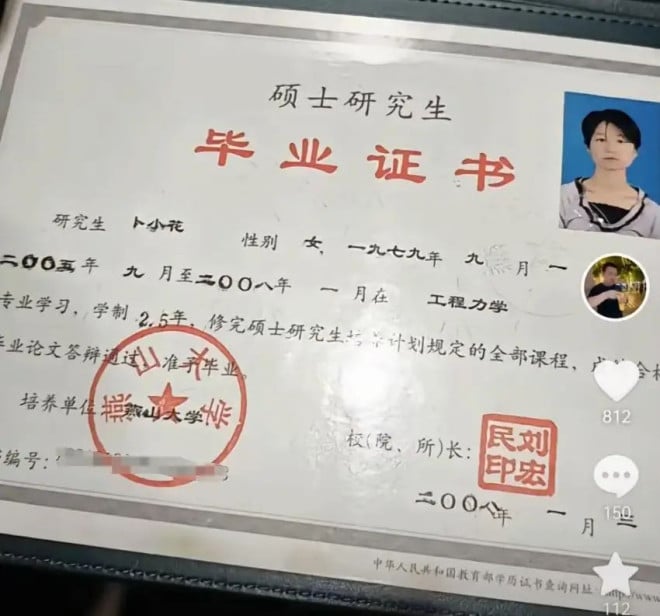
Bu Xiaohua’s diploma
Her education is significant to the story in many ways. First, it serves as an important bridge to her past. One of her former professors, the 82-year-old Bai Xiangzhong (白象忠), was one of the names Bu first wrote on a note when volunteers from the missing persons organization came to her house and asked her about her life.
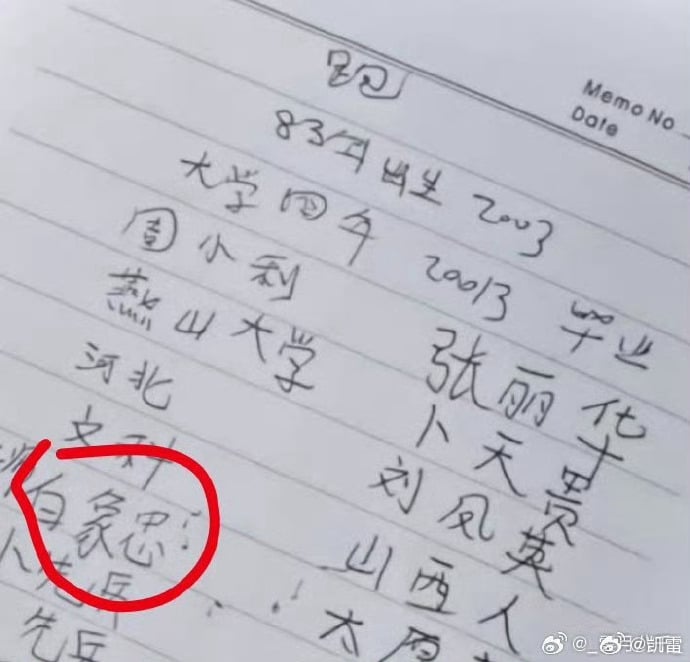
The name of Professor Bai Xiangzhong is one of the names Bu wrote down on a memo in the presence of volunteers trying to learn more about her life.
In recent news, it became known that Bai Xiangzhong learned of Bu’s story and was moved to tears upon hearing about her circumstances.
Bu’s education is also an important part of her identity. Recent videos showed Bu reading a book and pushing back her glasses—which she hadn’t had for 13.5 years—as if it was the most normal thing in the world.
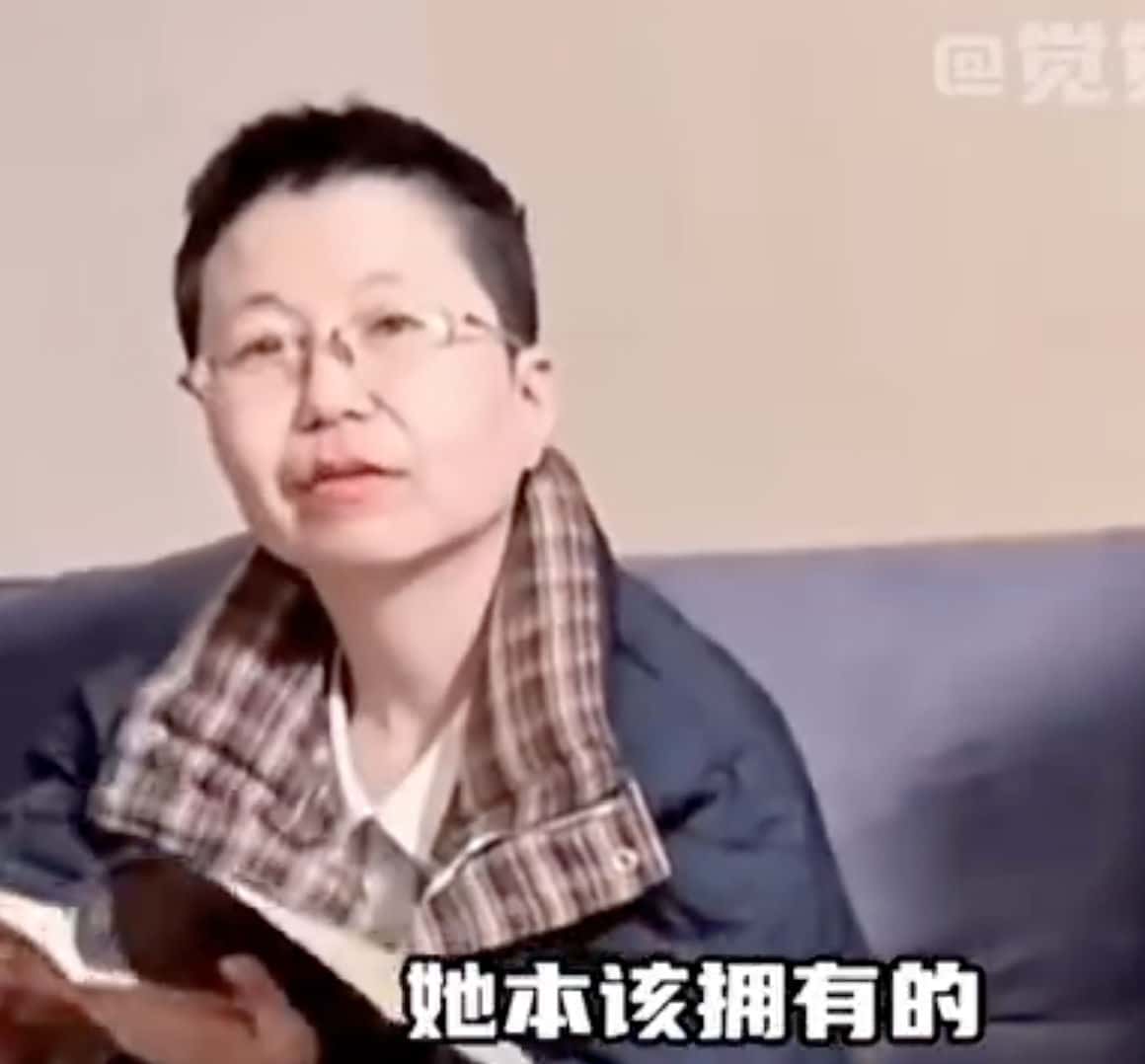
Recent videos showed Bu reading a book and pushing back her glasses—which she hadn’t had for 13.5 years—as if it was the most normal thing in the world.
One popular Weibo blogger (@我不是谦哥儿) wrote:
“More than the Master’s degree she obtained years ago, it’s this natural skill [the way she reads and pushes back her glasses] in which we can directly observe and vividly feel the life she had. We can feel that, if it were not for the dusky farmhouse in the mountainous area where she got trapped, there would have been an entirely different possibility [for her life].”
But her education is also significant in other ways. It shows that it is not just low-income, less-educated, rural women who can become victims of rape and human trafficking, but that even women with a university degree can end up in such situations.
4. Bu Xiaohua’s Case: A Reflection of Larger Social Issues
In the end, the story of Bu Xiaohua is attracting so much attention because she represents much more than just herself.
One of the most well-known stories similar to hers is that of Xiao Huamei (小花梅), the mother of eight children who was found tied to a shed in Xuzhou in 2022. After her story became a major trending topic on Chinese social media, local authorities launched a thorough investigation and uncovered the woman’s true identity. They found that she had been a victim of human trafficking back in 1998.
Like Bu, Xiao Huamei also suffered from mental illness. And similar to Bu’s case, local authorities failed to step in. The family received subsidies, and local officials approved the marriage between the mentally ill woman and her husband, Dong Zhimin, who was later sentenced to prison for his involvement in the human trafficking case.
This all brings back associations with the Chinese film Blind Mountain (盲山, 2007). Directed by Li Yang (李杨), the movie revolves around Bai Xuemei (白雪梅), a recent college graduate who is tricked into traveling to a remote mountain village under the pretense of securing a job. Once there, she is drugged, kidnapped, and sold into a forced marriage with a rural farmer. Trapped in the isolated and impoverished village, she faces constant physical and psychological abuse from her “husband,” his family, and even the local community, who see her captivity as normal or necessary. Despite multiple attempts to escape, she is repeatedly caught and encounters indifference or complicity from those around her, including the police. She is only rescued years later.

From Blind Mountain (2007).
Films such as Blind Mountain and the 2022 case of Xiao Huamei have helped create more awareness of the vulnerable position of Chinese women in rural areas, particularly those dealing with mental or physical disabilities. Last year, a marriage in Henan was denied after a local official found the woman, who was deaf and mute, had not learned sign language and could not write (read more).
But the problem persists. China, particularly its rural villages, faces a shortage of women stemming from the decades-long one-child policy and a traditional preference for boys. This has been further exacerbated by women migrating out of villages in search of better prospects. As a result, many rural single men are unable to marry, especially when they face additional challenges such as poverty or disability. Since marriage and children are considered social norms, these men and their families are often willing to take drastic measures. This situation has fueled the human trafficking of women for forced marriage in China since the 1980s.
“Why not re-release Blind Mountain?” some wonder. “It feels so relevant today.”

As for Bu, she is currently doing well given the circumstances. Her brother, who searched for her for so many years, is determined to take care of his sister. “My little sister is the treasure of our entire family,” he recently said. “Every day that I am on this earth is a day that I will take care of her.”
By Manya Koetse
(follow on X, LinkedIn, or Instagram)
Spotted a mistake or want to add something? Please let us know in comments below or email us. First-time commenters, please be patient – we will have to manually approve your comment before it appears.
©2024 Whatsonweibo. All rights reserved. Do not reproduce our content without permission – you can contact us at info@whatsonweibo.com.
Manya is the founder and editor-in-chief of What's on Weibo, offering independent analysis of social trends, online media, and digital culture in China for over a decade. Subscribe to gain access to content, including the Weibo Watch newsletter, which provides deeper insights into the China trends that matter. More about Manya at manyakoetse.com or follow on X.

You may like
China Memes & Viral
Nanchang Crowd Confuses Fan for Knife — Man Kicked Down and Taken Away
An unfortunate misunderstanding led to one innocent man being the only person injured in a crowd of thousands.
Published
1 week agoon
October 5, 2025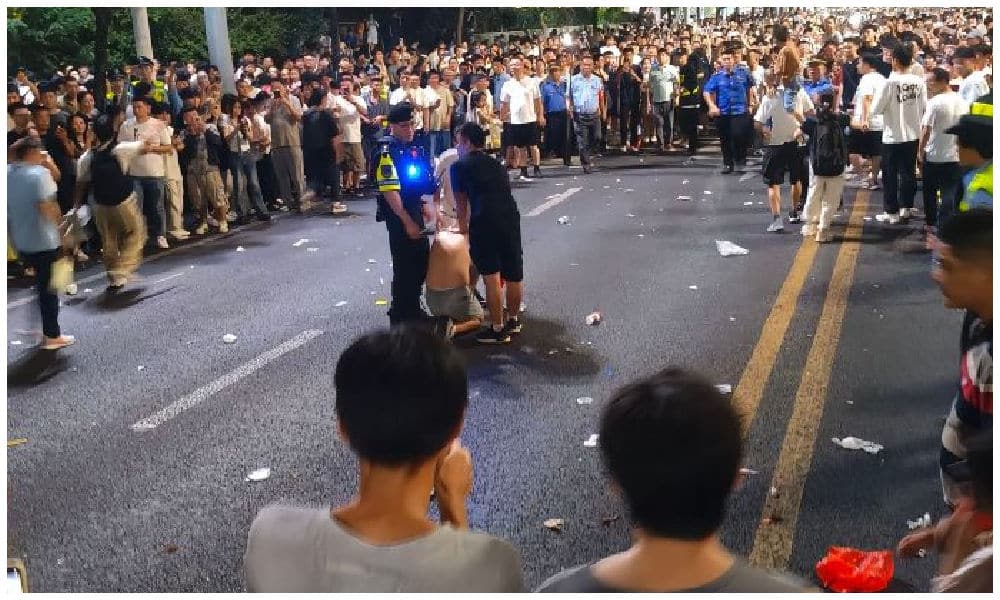
On the evening of October 1st, National Day and the start of a week-long holiday, Nanchang was celebrating with a spectacular fireworks/drone show, drawing an enormous crowd of people (see video).
But the fireworks weren’t the only thing drawing attention. One man on Nanchang’s crowded Shimao Road caught bystanders’ eyes.
He was shirtless, strongly built with a visible tattoo, and was waving a pointed object while loudly shouting something that sounded like, “I’ll kill you! I’ll kill you!”
At first, the people around him seemed unsure of what to do, keeping their distance and too afraid to approach. A large crowd formed but stayed back.
Then, a brave young man in red rushed forward and snatched the pointed object from his hand, while another young man leapt in with a flying kick that knocked him to the ground.
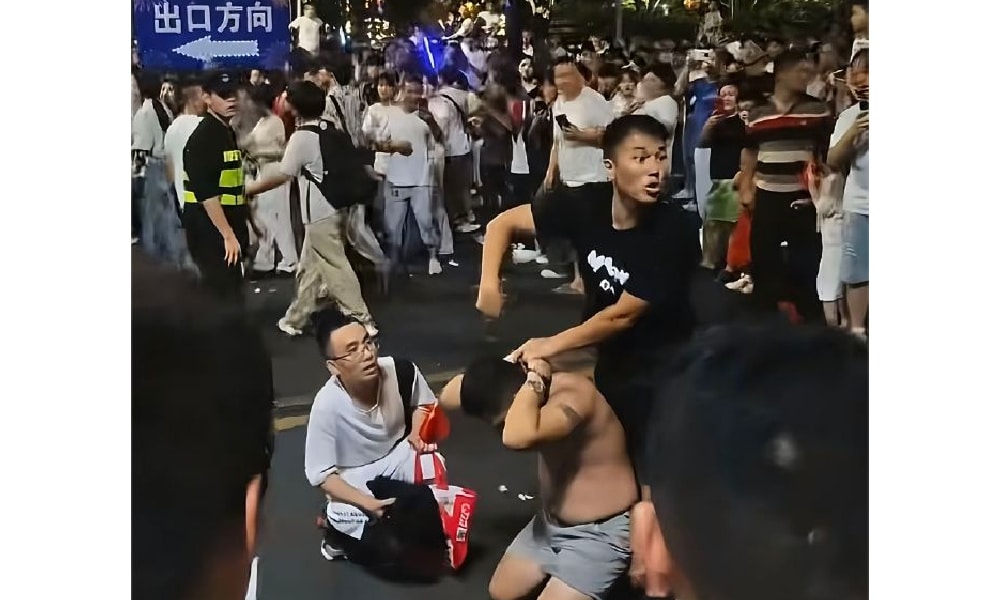
Several others then joined in, working together to restrain the man, as onlookers surrounded the scene and held him there until police arrived and took him to the station.
Soon, videos of the incident spread online (see video here), and rumors quickly surfaced that the man had been trying to attack people with a knife.

But that all turned out to be one major misunderstanding.
The next day, local police clarified what had actually happened, followed by an explanation from the man himself.
The man in question, a 31-year-old local second-hand car dealer named Li, had come to see the fireworks together with his family, including his sisters and three nephews.
Because of the very hot weather, he had taken off his shirt and was cooling himself with a 10-yuan folding fan he had just bought along the way.
After the show, while walking back, Li realized one of his nephews was missing and searched for him, calling out in his local dialect: “Where’s my kid? Where’s my kid?” (“我崽尼 我崽尼” wǒ zǎi ní).
Bystanders misheard this as “我宰你 我宰你” (wǒ zǎi nǐ, wǒ zǎi nǐ, “I’ll kill you, I’ll kill you”) and mistook his folding fan for a machete.
Meanwhile, Li couldn’t understand why people around him were avoiding him and keeping their distance from him while he was searching for his nephew (see that moment here, also see more footage here). People were watching him, and recording the scene from a distance.
Before Li realized what was happening, the fan was snatched from his hands and he was violently kicked. A crowd swarmed him, beat him, and pushed him to the ground.
The police then detained him, and it wasn’t until the early hours of October 2, after thorough questioning, that he was finally released.
“I’m still confused about it,” Li said the next day. Holding the fan up to the camera, he asked: “Can a fan like this really scare people? I don’t understand — I just got beaten for nothing.”
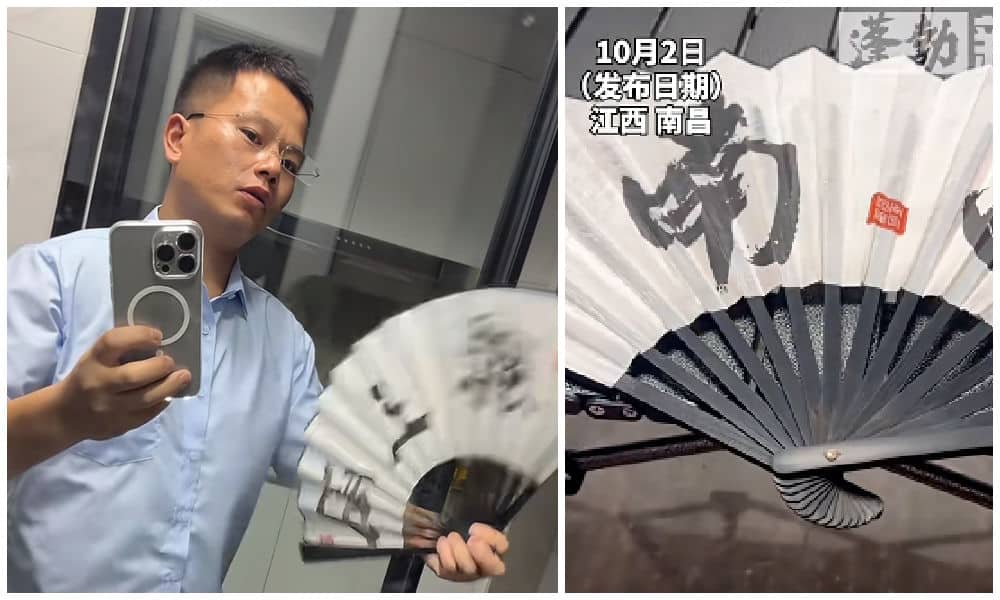
Mr Li in his video, showing the fan he bought for 10RMB/$1.4 at the Nanchang fireworks.
Some commenters remarked that out of the 1.2 million people who were out in Nanchang that night, he was the only one injured.
Li seems to be doing ok apart from a sore backside and a puzzled mind, and his nephew apparently is also safe and well.
The bizarre misunderstanding has sparked widespread banter online, with people now referring to Li as “Nanchang Brother Fan” (南昌扇子哥).
“I’m dying of laughter. It’s both tragic and hilarious,” one Douyin user wrote, while others simply called the situation “so drama” (抓马 zhuāmǎ): “I’m not supposed to laugh, but I can’t help it.”
Some also noted that they understood why people at the scene mistook Li for a criminal: “At night, a guy with tattoos, holding a long stick-like object, shouting loudly all the way, what would you think?”
All joking aside, the public’s response on such a crowded night — when so many people gathered together, potentially making a tempting target for those with bad intentions — shows a heightened sense of vigilance. Unlike the U.S., where gun violence is more common, shootings are rare in China. But random stabbings have increasingly made headlines.
For Nanchang in particular, a stabbing incident that shocked the nation had taken place only weeks earlier: a 19-year-old woman was attacked and stabbed more than ten times by a 23-year-old man she did not know, and later died from her injuries.
But there have also been other recent cases, from Wuhan to Leiyang. And in 2024 especially, a spate of stabbing incidents shocked the country. In Wuxi, Jiangsu Province, a mass stabbing left eight people dead and 17 others injured.
The positive takeaway from this entire mix-up is that the quick action of the crowd — despite their wrong assessment of the situation — shows that people weren’t afraid to step in for the sake of public safety.
But others claim the exact opposite is true. Illustrator and commentator ‘Wu Zhiru’ (吴之如), former editor at Zhenjiang Daily, saw the incident as an example of toxic herd mentality. He posted an illustration of a fan being held up with the characters 清风徐来 (qīng fēng xú lái, “a cool breeze slowly blows”), an idiom to describe a pleasant atmosphere. A finger from the right points at the fan-holder, saying “Look, he’s gonna commit violence!” (“哇,他要行凶啦!”)

Wu Zhiru warns against panic-driven mob mentality and wonders why the first man, who snatched the “knife” from Li’s hands, did not stop the crowd from attacking Li as soon as he discovered that he had snatched away a fan and not a blade. Drawing historical parallels to the Cultural Revolution, Wu argues that people are sometimes so set on doing the “heroic” thing that they hesitate to correct misunderstandings once better information is available — a mindset that can lead to serious, harmful consequences.
For Li himself, despite the unfortunate night he had, the situation has actually brought him some unexpected fame and extra attention for his second-hand car dealership, which undoubtedly makes his boss happy (in a very recent livestream, Li was praised for being kind and loyal).
Many netizens also argued that the real lesson to draw from this ordeal is the importance of speaking proper standard Chinese. Some even framed the incident as “The Importance of Mandarin” (论普通话的重要性), pointing out that the whole problem began because Li was misunderstood while speaking dialect.
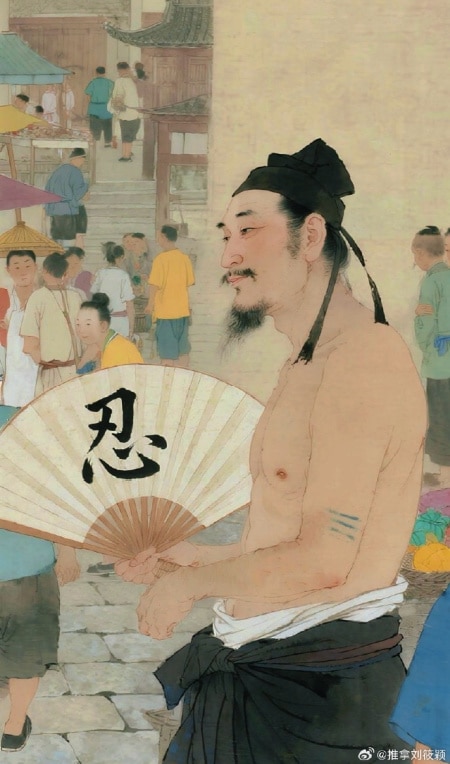
Image posted on Weibo in support of the “fan-waving brother.” The character on the fan says “tolerate.”
Others joked that the misunderstanding was just a grave injustice to shirtless men everywhere, writing: “From now on, the world has one less sincere guy who goes shirtless in the streets. He’ll never be the same again.”
By Manya Koetse
(follow on X, LinkedIn, or Instagram)
Spotted a mistake or want to add something? Please let us know in comments below or email us. First-time commenters, please be patient – we will have to manually approve your comment before it appears.
©2025 Whatsonweibo. All rights reserved. Do not reproduce our content without permission – you can contact us at info@whatsonweibo.com.
China Memes & Viral
China’s National Day Holiday Hit: Jingdezhen’s “Chicken Chop Bro”
From viral street food vendors to China’s donkey crisis and new eldercare services, here’s this week’s Weibo highlights in What’s on Weibo’s China Trend Watch.
Published
2 weeks agoon
September 30, 2025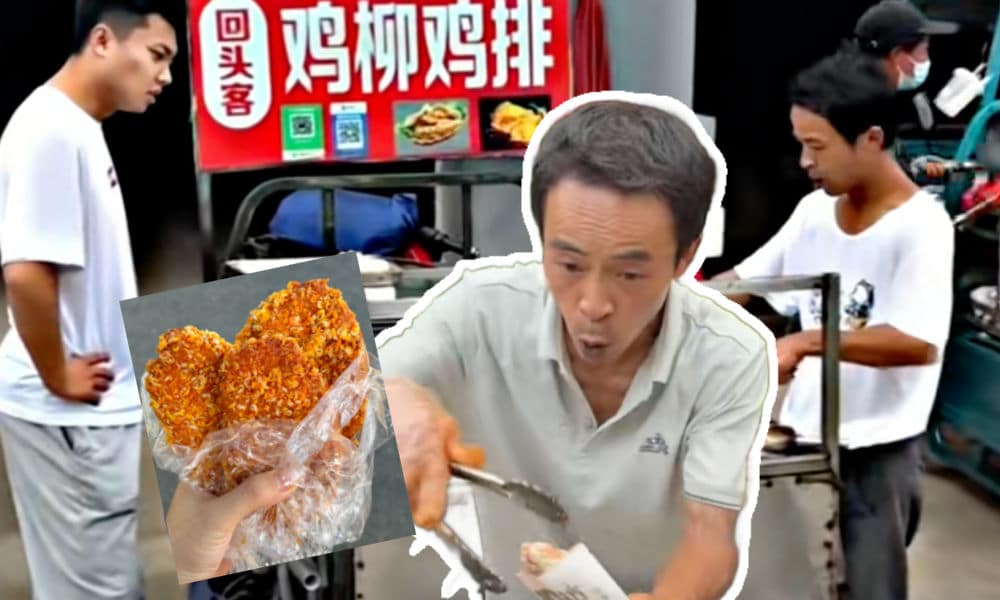
🔥 What’s Trending in China This Week? Stay updated with China Trend Watch by What’s on Weibo — your quick overview of what’s trending on Weibo and across other Chinese social media, curated by Manya Koetse.
What’s inside:
- 1. Jingdezhen’s “Chicken Chop Bro” Becomes Nationwide Meme
- 2. China’s 2025 Golden Week Travel Trends
- 3. China Faces Donkey Shortage Crisis
- 4. Word of the Week: “Ride-hailing for Relatives” 亲属打车 Qīnshǔ Dǎchē
- 5. What’s Inside at a Glance
1. Jingdezhen’s “Chicken Chop Bro” Becomes Nationwide Meme
From Beijing to Zibo, every now and then, food stall vendors go viral — for their charm, their uniqueness, and most of all, their tasty food. The star of this moment is 48-year-old Li Junyong (李俊永), who runs a small fried chicken stall in Jingdezhen, Jiangxi Province, with tight rules on who he serves, when, and how.
Li has suddenly become one of the most trending people on Chinese social media under the nickname “Chicken Chop Brother” (鸡排哥 jīpáigē).
Li initially gained popularity among customers for his frantic, multitasking energy — he doesn’t mess around when it comes to his chicken chop business, with superspeed and a clear order of serving customers (“I’ll first do you, then finish yours, then I’ll serve you 做完你的做你的”) and rules such as: no individual customers after 4:30 PM; students pay 1 yuan (about $0.15) less than regular passersby (after 12:00 PM, however, it costs 1 yuan more as punishment for being indecisive); and customers must open the plastic bag themselves before he puts the hot chicken cutlet inside.
The serious way he goes about dealing with his chicken chops almost makes you think he was making big business deals instead of selling to middle school students. In the end, it’s that attitude that gained him social media fame, as students started referring to him as “Head of Chicken Cutlet Operations” (free translation for 鸡排主理人 Jīpái gē Zhǔlǐrén).
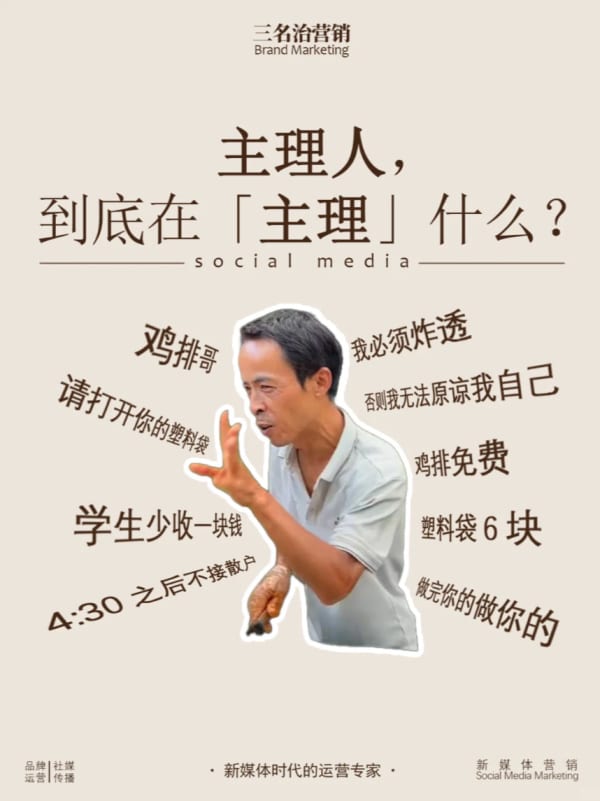
Head of Chicken Chop Operations: “Please open your plastic bag”, “No individual customers after 4:30 PM”, etc.
In light of Li’s explosive popularity, his chicken chop stall now sees extremely long queues, and local authorities and city management have had to intervene in order to control the crowds and keep the location safe.
There are definite downsides to such sudden fame, and Li is not the first street vendor this has happened to.
In 2023, for example, Beijing’s ‘Auntie Goose Legs’ (鹅腿阿姨) went viral, and the food stall owner became so overwhelmed that she temporarily had to take a break from her food stall, emotionally sharing how she said she felt too much pressure because of how the situation was unfolding, and that she just wanted to sell her goose legs in peace (“只想平平安安做烧烤”).
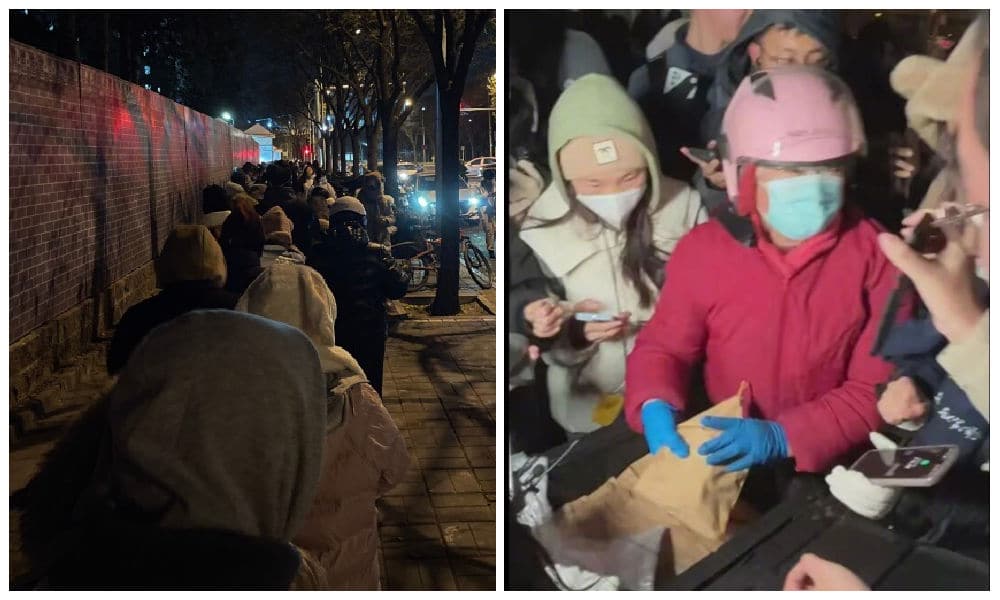
Long lines for Auntie’s goose legs.
It seems that “Brother Chicken Chops”, in line with his reputation as the chicken chop CEO, is trying to turn his viral moment into a sustainable business. According to Sina News, Li has drawn in relatives to help him. He reportedly has taught them how to make and sell his tasty fried chicken chops, and now his Chicken Chop Family (“鸡排家族”) has grown to a total of nine stalls.
Over the past week, Li has also joined several social media platforms, including Xiaohongshu, to build a social following that will last after the hype calms down.
Meanwhile, Li is the meme of the moment. As many Chinese workers experience working stress before the National Day holiday, they’ve used his superspeed working style videos to express the pressure they feel to finish all their deadlines. See videos here.
— What Else Is Trending —
2. China’s 2025 Golden Week Travel Trends

China’s longest holiday of 2025 is coming up, combining National Day (国庆节) and Mid-Autumn Festival (中秋节) into an eight-day Golden Week from October 1–8. If you’re traveling in China this week, good luck — the country’s transportation infrastructure is being pushed to its operational limits.
On September 30, the first “smart people” who opted to leave early to avoid traffic jams already found themselves stuck in them. China’s Ministry of Transport estimates a staggering 2.36 billion trips will be made during this period, with October 1 expected to see over 340 million travelers — surpassing the historical peak of 339 million recorded during Spring Festival earlier this year.
🔸 This week is going to see a lot of events. According to the Ministry of Culture & Tourism, more than 12,000 cultural activities will be held across China during the eight-day holiday period, including over 300 large-scale light shows.
🔸 Chinese local tourism offices are going all in on city marketing and are finding new strategies to make themselves more appealing to young travelers. Chengdu, for example, as Tencent’s gaming hub, is integrating the 10th anniversary of the super popular mobile game Honor of Kings (王者荣耀, Wángzhě Róngyào) into its cultural tourism strategy this year, organizing game-themed city walks, exhibitions, and more.
🔸 China’s travel platform Trip.com reported that interprovincial travel bookings have surged 45% year-on-year, with particularly strong interest in remote destinations like Xinjiang, Tibet, and Inner Mongolia. Searches for hotels in these regions jumped 60% compared to last year. This reflects a shift among middle-class Chinese tourists toward experiential travel and natural landscapes rather than crowded urban attractions.
🔸 The holidays are a time for relaxation, reunions, and eating mooncakes, but it’s also a stressful time for Chinese employers who must comply with labor regulations while managing workforce availability and overtime obligations. Under China’s Labor Law, employees working on statutory public holidays—October 1–3 and October 6 (the official Mid-Autumn Festival date)—must receive at least 300% of their normal daily wage. For adjusted rest days (October 4–5 and October 7–8), employers must provide either 200% overtime pay or compensatory time off. The State Council designated September 28 (Sunday) and October 11 (Saturday) as make-up workdays, but private companies have flexibility to adjust their own schedules.
3. China Faces Unprecedented Donkey Shortage Crisis

China is facing a serious donkey shortage. China’s donkey population is far below market demand, and the prices of donkey-related products continue to rise. The Donkey Branch of China’s Livestock Association (中国畜牧业协会驴业分会) addressed this issue in Chinese media earlier last week, telling China News Weekly (中国新闻周刊): “We have plenty of cattle and horses in China now — just not enough donkeys” (“目前我国牛马都不缺,就缺驴”).
4. “Ride-hailing for Relatives” 亲属打车 Qīnshǔ Dǎchē

Tencent has rolled out a new function via WeChat Mini Programs on September 26, aimed at helping seniors who struggle with app-based ride-hailing. Thanks to the new function, now live nationwide, users can order rides on behalf of older relatives directly in WeChat.
Adult children who want to help out their less tech-savvy (grand)parents or other senior relatives can now bind their account to their own, remotely pre-set pickup and drop-off locations, as well as payment methods, and track their journey for safety.
What makes this different from the possibility of just ordering a ride for someone else is that the seniors stay in control to some extent and can see their own journeys on their own phones. Children can configure settings on their side, while the interface for the elderly users is simplified. This allows seniors to ride independently, with a little help from their family.
The move is part of a broader effort in China to make it easier for seniors to stay involved in the digitalization of society.
The word to know is 亲属打车 qīnshǔ dǎchē, consisting of “亲属” qīnshǔ (relatives) and ride-hailing 打车 dǎchē.
5. What’s Trending at a Glance
- ✈️ The 27-year-old Sichuan creator “Tang Feiji” (唐飞机) died in a plane crash while livestreaming on Sept 27. The ultralight aircraft, piloted and purchased by Tang himself, went out of control and crashed before catching fire. Over 1,000 viewers were watching live, with the chat flooded by messages pleading for someone to rescue him. Local village officials confirmed his death. The tragedy is fueling debate over amateur aviation and extreme content creation.
- 🟢 Weibo has rolled out a visible “online status” feature on personal pages, showing when users are online, and not everyone is happy with it. The new feature is met with criticism from concerned users who don’t want others to see they’re online. It brings back memories of China’s legendary IM app QQ, which, like MSN, showed the online status of users.
- 🥿 A Chinese Marriott hotel location in Changzhou has come under scrutiny adn triggered hygiene concerns after guests found out that the in-room hotel slippers were being reused. The hotel has admitted to disinfected the disposable slippers and reusing them 2–3 times, without disclosing this to guests in advance.
- ⚖️ China’s cyberspace authorities issued stern warnings and announced penalties on various Chinese social platforms recently, including Xiaohongshu, Weibo, and Kuaishou, which are blamed for not keeping celebrity gossip and low-quality content in check and for influencing their hot search rankings. This is all about algorithm governance and the tightrope platforms walk in serving readers, attracting attention, and satisfying regulators.
- 👵 “Outsourced Children” services for Chinese seniors went trending recently. In Dalian, an initiative offering companionship and mediation services for seniors charges 500–2,500 yuan ($70–$350) per visit and has apparently been quite a success, underscoring strong market demand of eldercare-related services and new opportunities for Chinese students.
By Manya Koetse
(follow on X, LinkedIn, or Instagram)
Spotted a mistake or want to add something? Please let us know in comments below or email us. First-time commenters, please be patient – we will have to manually approve your comment before it appears.
©2025 Whatsonweibo. All rights reserved. Do not reproduce our content without permission – you can contact us at info@whatsonweibo.com.
Subscribe
What’s on Weibo is a reader-supported publication, run by Manya Koetse (@manyapan), offering independent analysis of social trends in China for over a decade. To receive new posts and support our work, consider becoming a paid subscriber.

Get in touch
Would you like to become a contributor, or do you have any tips or suggestions? Get in touch here!

How the “Nexperia Incident” Became a Mirror of China–Europe Tensions

China Faces Unprecedented Donkey Shortage Crisis

Nanchang Crowd Confuses Fan for Knife — Man Kicked Down and Taken Away

The Wong Kar-wai Scandal Explained: The Dark Side of ‘Blossoms Shanghai’

China’s National Day Holiday Hit: Jingdezhen’s “Chicken Chop Bro”

Hidden Cameras and Taboo Topics: The Many Layers of the “Nanjing Sister Hong” Scandal

“Jiangyou Bullying Incident”: From Online Outrage to Offline Protest

The Rising Online Movement for Smoke-Free Public Spaces in China

China Trend Watch: Pagoda Fruit Backlash, Tiananmen Parade Drill & Alipay Outage (Aug 11–12)

From Schadenfreude to Sympathy: Chinese Online Reactions to Charlie Kirk Shooting
Popular Reads
-

 China Memes & Viral3 months ago
China Memes & Viral3 months agoHidden Cameras and Taboo Topics: The Many Layers of the “Nanjing Sister Hong” Scandal
-

 China Books & Literature12 months ago
China Books & Literature12 months agoThe Price of Writing Smut: Inside China’s Crackdown on Erotic Fiction
-

 China Insight5 months ago
China Insight5 months agoUnderstanding the Dr. Xiao Medical Scandal
-

 China Memes & Viral10 months ago
China Memes & Viral10 months agoOur Picks: Top 10 Chinese Buzzwords and Phrases of 2024 Explained


